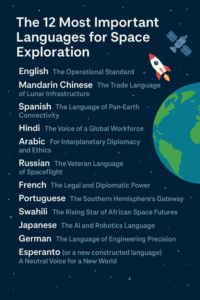The Twelve Languages That Will Shape Humanity’s Voice Among the Stars
27th May 2025

As we stand on the threshold of a spacefaring era, the way we communicate is poised for a radical transformation. In the next century, as space tourism, lunar settlements and Mars missions become not just science fiction but daily headlines, languages—our most powerful tool for connection—will evolve to meet new needs.
But which languages will shape this next chapter of human evolution? Based on demographic trends, economic influence, technological relevance and cultural clout, we believe these twelve languages will emerge as humanity’s linguistic vanguard in space—and each will serve a distinct purpose.
- English – The Universal Operational Language
Today’s lingua franca of science, aviation and international business will remain the backbone of mission control, engineering and research communication. From interstellar contracts to AI protocols, English will likely be the default for technical accuracy and inter-agency coordination.
- Mandarin Chinese – The Language of Expansion and Trade
With China’s growing space ambitions and its significant economic weight, Mandarin will be vital for trade, infrastructure and governance in off-world settlements. Expect Mandarin to be the language of lunar logistics, deep-space mining consortia and Martian megacities with Chinese investment.
- Spanish – The Cross-Continental Communicator
With over 500 million speakers and influence across Europe, Latin America and the U.S., Spanish is poised to play a crucial cultural and commercial role. Spanish-language content, entertainment and educational materials will flourish in off-Earth colonies, creating a sense of community among diverse populations.
- Hindi – The Voice of Earth’s Next Great Workforce
India’s burgeoning tech sector and its ambitious space program (ISRO) suggest a rising role in interplanetary exploration. Hindi—and regional Indian languages—will support communication among a large segment of Earth’s labour force contributing to space-based industries and services.
- Arabic – The Diplomatic and Cultural Link Across Worlds
Arabic’s use across multiple nations and its role in global diplomacy and Islamic scholarship position it as a key language for interplanetary ethics, religious discourse and cultural continuity. It could also serve vital roles in negotiations and international treaties governing space.
- Russian – The Engineering Veteran
Given its legacy in spaceflight and continued expertise in spacecraft technology, Russian will maintain a specialized status in engineering, propulsion systems and astronaut training. It is the language of tradition in space science, still spoken aboard the ISS.
- French – The Language of Policy and Planetary Law
French is already one of the primary languages of the UN and international law. In space, it will be instrumental in shaping planetary governance, space law and diplomatic communication—especially as global cooperation becomes key to peaceful expansion.
- Portuguese – The Bridge to the Southern Hemisphere
With Brazil’s growing aerospace industry and cultural influence, Portuguese may rise in prominence—particularly in trade and cultural exchange across Earth’s southern nations and off-world settlements where Brazil might have economic stakes.
- Swahili – The Future Voice of a Rising Continent
Africa’s demographic explosion and growing space interest (notably in Kenya and Nigeria) make Swahili a strong candidate for future relevance. It could serve as the language of youth-led innovation and Earth-based support centres in the Global South.
- Japanese – The Language of Innovation and AI Ethics
Japan’s role in robotics, AI and advanced space tech ensures Japanese will remain vital, especially in contexts involving human-machine interfaces, space robotics and interstellar design. Its cultural exports will also shape off-Earth entertainment and aesthetics.
- German – The Precision Tongue of Engineering and Research
Germany’s contributions to space research, physics and engineering give the German language enduring technical relevance. It may remain a preferred language in scientific publishing and multinational research projects in space.
- Esperanto (or a future constructed language) – The Dream of True Neutrality
Though not widely spoken today, Esperanto or a similar constructed language might find purpose as a neutral, non-national language in extraterrestrial governance, philosophy or even religious expression. Its logical structure and idealism may appeal in multicultural, multi-planetary contexts.
A New Tower of Babel, Orbiting the Stars
As humanity ventures farther into the cosmos, linguistic diversity will no longer be a challenge to overcome—but a strength to embrace. Each of these languages will bring a unique lens to the human experience, offering different ways to understand science, emotion, ethics and identity. Translation, interpretation and localization services will become even more critical—not only to bridge gaps between Earth-bound cultures but also to connect the scattered outposts of human civilization across the stars.
At Foreign Tongues Market Research Translation, we are already preparing for this next chapter. Whether you are launching a product in orbit, interpreting intergovernmental agreements on Mars or localizing AI systems for multilingual crews, the future is multilingual—and it is out of this world.
